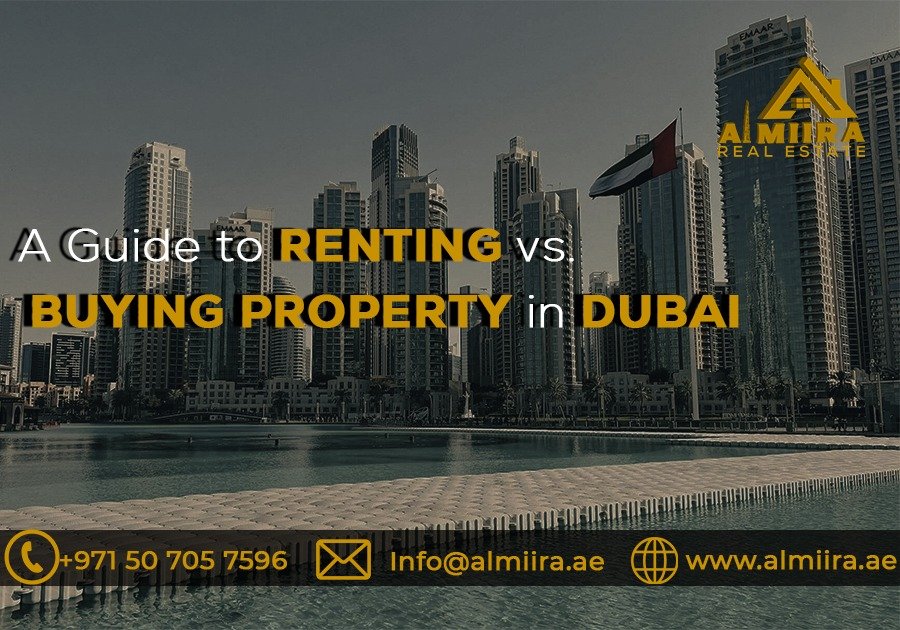
Dubai’s real estate market offers a wide variety of opportunities for residents, expatriates, and investors alike. However, one of the biggest decisions anyone faces when moving to or investing in Dubai is whether to rent or buy property. Each option comes with its own advantages and disadvantages, and the choice largely depends on personal circumstances, financial goals, and market conditions.
In this guide, we’ll provide a comprehensive comparison between renting and buying property in Dubai, weighing the pros and cons of each option to help you make an informed decision.
1. The Dubai Real Estate Market Overview
Dubai’s real estate market is renowned for its rapid growth, luxury developments, and significant foreign investment. With continuous infrastructure projects and new residential communities, the city’s property market offers a wide range of options, from affordable apartments to ultra-luxury villas.
Key Statistics:
- High Rental Yields: Dubai offers rental yields between 5% and 9%, higher than many other global cities, making it attractive for property buyers and investors.
- Stable Prices: In recent years, property prices in Dubai have stabilized, creating favorable conditions for both renting and buying.
- Expat-Friendly: Foreign nationals can buy property in freehold areas, making Dubai an attractive location for expatriates looking for long-term residency.
2. Renting Property in Dubai
Renting a property is the most common option for expatriates and short-term residents in Dubai. The rental market is vast, offering everything from studio apartments to luxury villas. However, while renting offers flexibility, it doesn’t come with the same financial benefits as owning property.
Pros of Renting in Dubai:
- Flexibility: Renting offers the flexibility to move locations or upgrade to a new home without long-term financial commitments. This is ideal for those who might be in Dubai for a short-term work assignment or aren’t sure about long-term residency.
- No Maintenance Costs: When you rent a property, the landlord is usually responsible for repairs and maintenance, relieving you from these additional expenses.
- Lower Upfront Costs: Renting generally requires an upfront payment of 4 to 12 months of rent, but it’s significantly lower than the down payment needed to buy a property.
- Access to Prime Locations: Renting often allows you to live in prime areas like Downtown Dubai, Palm Jumeirah, or Dubai Marina without having to make the financial commitment of purchasing a property.
Cons of Renting in Dubai:
- No Asset Ownership: Rent payments do not contribute to owning an asset, meaning you’re essentially paying to live without accumulating long-term value.
- Annual Rent Increases: Rent can increase annually based on market conditions, which may disrupt your budgeting.
- Limited Customization: Tenants often face restrictions on making changes to the property, limiting their ability to personalize their living space.
Conclusion: Renting is ideal for individuals or families seeking flexibility or who plan to stay in Dubai for the short or medium term without making large financial commitments.
3. Buying Property in Dubai
Buying property in Dubai has become increasingly attractive due to favorable laws for expatriates, competitive prices, and high rental yields. Whether you’re looking for a personal residence or a lucrative investment, owning property in Dubai has several financial and lifestyle benefits.
Pros of Buying in Dubai:
- Building Equity: When you buy a property, your payments contribute toward owning an asset. Over time, the property may appreciate in value, offering the potential for profit upon resale.
- Stable Housing Costs: Buying means you won’t have to worry about annual rent increases, and your mortgage payment stays relatively stable throughout the loan term.
- High Rental Yields: Investors can enjoy rental yields as high as 8% in certain areas, making Dubai’s property market a lucrative investment option.
- Freehold Property Ownership: Expatriates can own property in designated freehold areas such as Dubai Marina, Jumeirah Lake Towers, and Arabian Ranches. Ownership provides long-term stability and a sense of security.
- Golden Visa Eligibility: Property buyers who invest a certain amount in Dubai real estate may become eligible for a Golden Visa, granting long-term residency benefits.
Cons of Buying in Dubai:
- High Upfront Costs: Buying a property requires a substantial upfront investment, typically including a 20-25% down payment for expatriates, as well as additional costs such as registration fees and agent commissions.
- Maintenance Responsibility: As a homeowner, you’re responsible for maintenance and repairs, which can add to ongoing costs.
- Market Fluctuations: While the Dubai real estate market has seen periods of growth, it is subject to fluctuations. Buyers should be prepared for the possibility of property values declining in the short term.
Conclusion: Buying property in Dubai is a long-term commitment that provides financial stability and growth potential. It’s an ideal choice for those planning to stay in Dubai for an extended period or those seeking to build an investment portfolio.
4. Renting vs. Buying: Financial Considerations
Deciding whether to rent or buy often comes down to your financial situation and long-term goals. Here’s a comparison of the financial aspects of renting versus buying a property in Dubai:
a. Upfront Costs
- Renting: Typically, you’ll need to pay between 4 and 12 months of rent in advance, as well as a security deposit (5% of the annual rent for unfurnished properties, 10% for furnished). Agency fees are usually around 5% of the annual rent.
- Buying: You’ll need a 20-25% down payment, a Dubai Land Department (DLD) fee (4% of the property value), and agency fees (2% of the property value). There are also mortgage processing fees if applicable.
b. Monthly Payments
- Renting: You’ll be responsible for rent payments as well as utilities, internet, and any maintenance fees for specific buildings or communities.
- Buying: Mortgage payments are the main monthly expense for buyers. Depending on the size of your down payment and mortgage rate, this could be higher or lower than typical rent. You’ll also be responsible for service charges and maintenance.
c. Tax Benefits
- Renting: There are no tax advantages for renting in Dubai.
- Buying: Dubai is a tax-free city, which means there are no property taxes on owned real estate. This is a significant advantage for buyers over other global cities where property taxes can be a substantial ongoing expense.
5. Factors to Consider When Deciding Between Renting and Buying
a. Length of Stay
If you plan to stay in Dubai for a short period (1-3 years), renting might be the better option as it offers flexibility without long-term financial commitments. However, if you’re planning to stay for 5 years or more, buying a property may provide better value, as you’ll build equity rather than spending on rent.
b. Financial Stability
Buying a property requires a significant upfront investment. If you have sufficient savings and stable income, buying may be a good choice. However, if you’re not in a position to make a large down payment, renting can be a more feasible option.
c. Investment Goals
For investors, buying property in Dubai can be a lucrative opportunity due to high rental yields and the city’s appeal to global expatriates. If you’re looking for a long-term investment, buying a property could offer better returns than renting. However, managing a rental property comes with its own set of responsibilities and costs.
6. Best Areas to Rent or Buy Property in Dubai
Dubai offers a diverse range of neighborhoods catering to various needs, whether you’re looking to rent or buy.
a. For Renting:
- Dubai Marina: A favorite for expats, offering waterfront views, luxury apartments, and a vibrant lifestyle.
- Jumeirah Lake Towers (JLT): More affordable than Dubai Marina, with easy access to business hubs.
- Downtown Dubai: Ideal for those who want to live close to major attractions like the Burj Khalifa and Dubai Mall.
b. For Buying:
- Palm Jumeirah: Offers some of the most luxurious villas and apartments in Dubai, ideal for long-term investment.
- Arabian Ranches: A family-friendly community with spacious villas and townhouses.
- Business Bay: A prime area for business professionals, with high potential for property appreciation.
7. Conclusion: Which is Right for You?
Deciding between renting and buying property in Dubai depends on your financial situation, long-term plans, and lifestyle preferences. Renting offers flexibility and lower upfront costs, making it a good choice for short-term residents or those uncertain about long-term commitments. Buying, on the other hand, offers long-term financial benefits, stability, and the potential for property appreciation, especially in a market like Dubai.
For those considering investing in Dubai’s real estate market, Al Miira Real Estate provides expert guidance, helping you navigate the complexities of the market and find the best option suited to your needs. Whether you’re looking to rent or buy, Al Miira’s team of specialists ensures you make a decision that aligns with your financial goals and lifestyle aspirations.





Leave a Reply